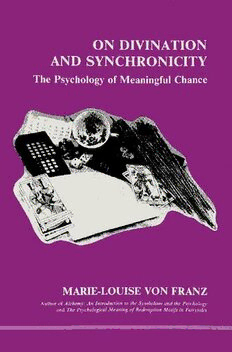
On Divination and Synchronicity: The Psychology of Meaningful Chance PDF
Preview On Divination and Synchronicity: The Psychology of Meaningful Chance
ON DIVINATION AND SYNCHRONICITY The Psychology of Meaningful Chance MARIE-LOUISE VON FRANZ Author of Alchemy: An Introduction to the Symbolism and the Psychology and The Psychological Meaning of Redemption Motifs in Fairytales ON DIVINATION AND SYNCHRONICITY Marie-Louise von Franz, Honorary Patron STUDIES IN JUNGIAN PSYCHOLOGY BY JUNGIAN ANALYSTS Daryl Sharp, General Editor ON DIVINATION AND SYNCHRONICITY The Psychology of Meaningful Chance MARIE-LOUISE VON FRANZ Canadian Cataloguing in Publication Data Franz, Marie-Louise von, 1915- On divination and synchronicity (Studies in Jungian psychology ; 3) Based on a series of lectures delivered in 1969 at the C.G. Jung Institute in Zurich, Switzerland. Includes index. ISBN 0-919123-02-3 1. Coincidence in psychical research — Psychological aspects. 2. Divination. 3. Psychical research. 4. Jung, Carl Gustav, 1875-1961. I. Title. II. Series. BF1175.F72 133 C80-094576-X Copyright © 1980 by Marie-Louise von Franz. All rights reserved. INNER CITY BOOKS Box 1271, Station Q, Toronto, Canada M4T 2P4 Honorary Patron: Marie-Louise von Franz Publisher and General Editor: Daryl Sharp Editorial Board: Fraser Boa, Daryl Sharp, Marion Woodman Marte-Loutse von Franz ts a Jungian Analyst practising in Ktisnacht, Switzerland. Cover Photo by Dave Sharp. Illustrations by Ann Yeoman. Set in Baskerville by Blain Berdan, Toronto. Printed and bound in Canada by University of Toronto Press Incorporated CONTENTS Lecture 1 7 Lecture 2 28 Lecture 3 51 Lecture 4 74 Lecture 5 98 Index 119 Please see final pages for Catalogue and Order Form This book is based on the transcription by Miss Una Thomas of the lecture series presented by Dr. von Franz at the C.G. Jung Institute, Zurich, in the fall of 1969. The author and publisher are grateful to Miss Thomas for her faithful preparation of the original version. The text in its present form was edited for publication by Daryl Sharp and Marion Woodman. The index was compiled by Daryl Sharp. Lecture | You may perhaps know of the amusing fact that originally divi- nation was always practised in churches. The old Jews, for instance, had a divination oracle in their sanctuaries in Jerusalem and on certain occasions when the priest wanted to consult Jahweh he tried through such oracles to discover the will of God. In all primi- tive civilizations divination techniques have been used to find out what God, or the gods, want, but in time this has been discontinu- ed and outgrown; it has become a dark, magical, and despised practice, but today this lecture is being given in the Kirchgemeinde (parish church), a nice little synchronicity. The view of the world which Jung tried to bring back into focus, and on which divination basically rests, is that of synchronicity; therefore before we go into details about the problems of divina- tion we have to remember what Jung said about synchronicity. In his Foreword to the English edition of Richard Wilhelm’s transla- tion of The I Ching or Book of Changes, he gives a very good sum- mary of the difference between causal and synchronistic thinking. Causal thinking is, so to speak, lineal. There is a sequence of events A, B, C, D, and you think backwards and wonder why D appears because of C, why C appears because of B, and why B because of A, like some kind of inner or outer event. One tries to trace back in one’s mind why these coordinate effects have worked. We know that through the investigations of modern physicists it has now been proved that on the microphysical level this principle is no longer completely valid; we can no longer think of causality as absolute law, but only as a tendency or prevailing probability. So causality is shown to be a way of thinking which satisfies our mental grasp of a cluster of physical events, but docs not complete- 7 ly get at the core of natural laws, it only delineates general trends or possibilities. Synchronistic thinking, on the other hand, one could call field thinking, the centre of which is time. Time also comes into causality since we normally think that the cause comes before the effect. In modern physics it sometimes looks as if the effect came before the cause, and therefore they try to turn it round and say that you could still call that causal; but I think Jung is right in saying that that is enlarging and twisting the idea of causality ad absurdum so far that it loses its meaning. Nor- mally, cause always comes before effect, so there also is a lineal idea of time, before and after, with the effect always after the be- fore. Synchronistic thinking, the classic way of thinking in China, is thinking in fields, so to speak. In Chinese philosophy such think- ing has been developed and differentiated much more than in any other civilization; there the question is not why has this come about, or what factor caused this effect, but what likes to happen together in a meaningful way in the same moment? The Chinese always ask: ‘What tends to happen together in time?”’ So the centre of their field concept would be a time moment on which are clustered the events A,B,C,D, and so on (Figure 1). G A E C D Figure 1. Field of time (time-bound ensemble of events). Richard Wilhelm puts it very well in his Introduction to the J Ching where he speaks of the complex of events which occur at a certain time moment. In our causal thinking we have made a big separation between psychic events and physical events, and we only watch to see how physical events produce, or have a causal effect upon, each other and on psychological events. Right up to the 19th century the idea still persisted in the sciences (and it still does in those less de- 8
